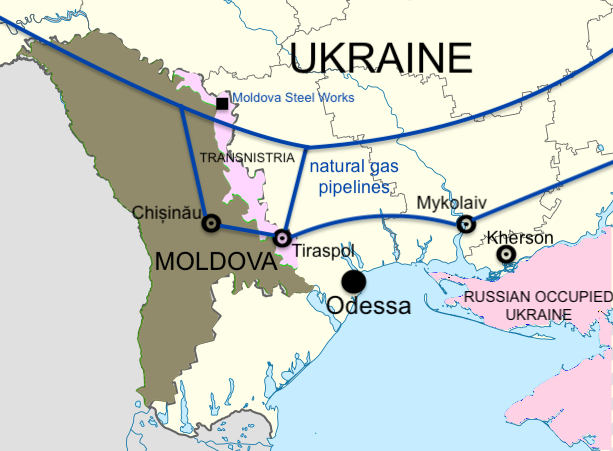|
Today's Opinions, Tomorrow's Reality
Dubious Future By David G. Young Washington, DC, January 21, 2025 -- An end to free Russian gas for Transnistria could bring the regions's downfall. When Ukraine closed the spigots on Russia's natural gas pipeline to Europe, the consequences for the city of Tiraspol were especially dire. In the last three weeks, all industrial plants not part of the food supply chain have shut down to conserve energy, and some residents have resorted to burning wood to heat their homes during the peak of winter.1 With fuel supplies running low, leaders in the city have caved on their stubborn refusal to buy European natural gas.2 This change is a huge financial blow for the city and surrounding region, long spoiled by receiving free natural gas from its distant supporters in Moscow. Tiraspol is a geopolitical oddity. It's the capital of the breakaway region of Transnistria, a long sliver of land along the Dniester river and the border between Ukraine and Moldova. For decades during Soviet rule, the heavily-industrialized region of land on the Ukrainian side of the river was politically attached to Moldova, despite being populated mostly by Russian and Ukrainian speakers. When the Soviet Union fell apart and Romanian-speaking Moldova declared independence, it triggered a war of secession that saw Transnistria become a de-facto Russian outpost on the far side of Ukraine. For years, Russian "peacekeeper" troops saved Transnistria from integration with the rest of Moldova while also guarding an enormous Soviet ammunition dump in the region. After the war broke out in Ukraine, both Moldova and Ukraine blocked fresh Russian troops from coming and going in Transnistria, stranding Russian officers in the country and ensuring the "Russian" troops are made up of local recruits.
The gas cutoff threatens to end the de-facto independence of this Russian outpost. Long propped up by free Russian gas, the largely unreformed Soviet industrial infrastructure never fully came to terms with post-Soviet economics. indeed, the flag and state seal of Transnistria still features the Soviet hammer and sickle. Faced with paying market prices for European gas, the economy of Transnistria faces collapse. Since early January, the Moldova Steel Works, the regions's largest company and exporter, has shut down, idling 2000 workers.3 Given an abrupt rise in energy prices, the plant, like the entire proto-state of Transnistria, faces a dubious future. This is a dramatic turn of events for Transnistria, which just three years ago had realistic hopes of uniting with Russia. Had the Russian invasion of Ukraine reached the nearby city of Odessa, the "Russian" troops in Transnistria would have been there to welcome them. Those dreams were dashed when the push for Odessa failed on two fronts, first when its army was beaten back from bridges over the Bug river near Mykolaiv in early 2022, then when its navy was ousted from the western Black Sea by Ukrainian sea drones in 2023. Throughout the war, the Russian outpost on Ukraine's far western edge has been eerily quiet. Ukraine bided its time, never launching a strike, deploying its troops to fight greater and more immediate threats in the east. And amazingly, it continued to allow Russia's Gazprom company to ship gas through Ukraine's pipeline network to the Russian separatists in Transnistria. The continued flow of Russian gas across Ukraine for nearly three years of war sounds crazy, but there was a logic behind it. Immediately cutting off the flow would anger customers in the European Union states of Hungary and Slovakia, creating headaches for Ukraine's allies in other parts of the European Union. And not inconsequentially, the shipment of gas through its pipelines was also a big money-maker for Ukraine. Naftogaz, the company that runs the pipelines, is a major source of funding for the Ukrainian government, supplying it $100 million in 2018.4 The ending of the Gazprom transshipment contract on January 1 provided an obvious time for Ukraine to end the program, while minimizing the consequences. Yes, people in Slovakia and Hungary are still angry, but they had plenty of notice. Yes, Ukrainian state coffers will take a hit, but they have other sources of funding thanks to their European allies. On the plus side, the shut down will also hurt Russia's economy and perhaps serve as a fatal blow to the Russian separatists in Transnistria. Related Web Columns: The Bridge to Odessa, June 28, 2022 Unfrozen Conflicts, October 3, 2023 Notes: 1. Moscow Times, Transnistria Ready to Buy Gas From Moldova, Kremlin-Backed Leader Says , January 20, 2024 2. Ibid. 3. Steel Radar, Moldova Steel Works Has Suspended Operations, January 15, 2025 4. Obozrevatel, Приніс бюджету 137 minutos: названий найбільший платник податків України, September 1, 2019 |


